So You Want to Sing
Music Theater
So You Want to Sing
A Guide for Professionals
A Project of the National Association of Teachers of Singing
So You Want to Sing: A Guide for Professionals is a series of works devoted to providing a complete survey of what it means to sing within a particular genre. Each contribution functions as a touchstone work for not only professional singers, but students and teachers of singing. Titles in the series offer a common set of topics so readers can navigate easily the various genres addressed in each volume. This series is produced under the direction of the National Association of Teachers of Singing, the leading professional organization devoted to the science and art of singing.
So You Want to Sing Music Theater: A Guide for Professionals, by Karen Hall, 2014.
So You Want to Sing
Music Theater
A Guide for Professionals
Karen Hall
Allen Henderson
Executive Editor, NATS

A Project of the National Association of
Teachers of Singing
ROWMAN & LITTLEFIELD
Lanham Boulder New York Toronto Plymouth, UK
Published by Rowman & Littlefield
4501 Forbes Boulevard, Suite 200, Lanham, Maryland 20706
www.rowman.com
10 Thornbury Road, Plymouth PL6 7PP, United Kingdom
Copyright 2014 by Rowman & Littlefield
All photos courtesy of Dr. Scott McCoy.
All rights reserved. No part of this book may be reproduced in any form or by any electronic or mechanical means, including information storage and retrieval systems, without written permission from the publisher, except by a reviewer who may quote passages in a review.
British Library Cataloguing in Publication Information Available
Library of Congress Cataloging-in-Publication Data
Hall, Karen, 1955 author.
So you want to sing music theater : a guide for professionals / Karen Hall.
pages cm. (So you want to sing)
Includes bibliographical references and index.
ISBN 978-0-8108-8838-8 (pbk. : alk. paper) ISBN 978-0-8108-8839-5 (ebook)
1. SingingInstruction and study. 2. MusicalsInstruction and study. I. Title.
MT956.H34 2014
782.1'143dc23
2013048847
 TM The paper used in this publication meets the minimum requirements of American National Standard for Information Sciences Permanence of Paper for Printed Library Materials, ANSI/NISO Z39.48-1992.
TM The paper used in this publication meets the minimum requirements of American National Standard for Information Sciences Permanence of Paper for Printed Library Materials, ANSI/NISO Z39.48-1992.
Printed in the United States of America
Dedicated to the three wonderful women who encouraged, supported, loved, and made me who I am today. I want to acknowledge the huge difference they made in my life.
Sandra Otts Hall, mother
Jessie McKinney Otts, grandmother
Jean Nicolas, first voice teacher (high school)
List of Figures
Acknowledgments
Rarely is any endeavor a solo pursuit. Writing this book is no exception. I would like to thank Allen Henderson, executive editor of this series and executive director of the National Association of Teachers of Singing for his always kind and helpful advice; Wayne Lee, my writing coach for helping me improve my work immeasurably; Mary Saunders-Barton for her support and friendship; Bennett Graff, senior acquisitions editor at Rowman & Littlefield for challenging me to improve my work; and all my friends and family who offered their words of support along the way.
Foreword
If you are holding this book in your hands, you were prompted by the title. Possibly you are a classical singer or performer considering a trip to the dark side, or a music theater performer who has felt adrift in terms of technique because you never connected to a teacher who addressed your concerns. Whatever your motivation, this book will give you the courage to pursue proficiency in the wonderful art of music theater singing.
For many reasons, Karen Hall is the perfect choice to write this book. She has taken the very same journey many of you are charting, and it is what gives her the credentials to lead you forward. She, like many people smitten by music theater in their early years, became a classical singer when no other option seemed available. Times have changed!
I first met Karen at the National Association of Teachers of Singing (NATS) winter workshop in New York City in 2000. During a session I taught called Sing Out, Louise! she jubilantly experimented with her own belt. She has since been actively teaching and researching the style and building an impressive knowledge base to bring to this book.
Its a daunting project, but Karen has undertaken it with energy and passion. By definition, music theater is a collaborative art form, incorporating a host of different skills. Music theater singing teachers depend on the support of their colleagues in voice science, health matters, and real-world performance practice. Karen has very wisely realized that no single person could write this book, and she has enlisted the help of experts in these key areas to augment and strengthen the work.
A strong additional feature will be a listening component. How can you be sure of sounds without actually hearing them? The book is organized to give you the maximum opportunity to comprehend technical differences between classical and music theater singing, and the aural factor is critical to that.
A number of years ago, it would have seemed unthinkable to legitimize a pedagogy considered not only alternative but also possibly dangerous to the voice. The only way Broadway performers could work on the kind of singing they were being asked to do was on their own by trial and error or in a private New York City studio with a teacher who honored the style. Sometimes even those teachers hesitated to encourage students to make sounds they could not make themselves.
Times have changed! As someone hopelessly in love with this art form, I am deeply gratified to see a book on music theater singing finally available to take its place beside the mountain of resources at hand for classical singers. Its a mighty first step!
Mary Saunders-Barton
Head of Voice for Music Theatre
Head of Graduate Voice Pedagogy for Music Theatre
Penn State University
Introduction
When I was a little girl, I fell in love with music, especially voice and piano. Whether it was in church, at pop music concerts, on TV, or at music theater productions such as South Pacific, My Fair Lady, and Mary Poppins, I always came away humming the songs. I was hooked. I wanted to be up there onstage, singing those songs, playing the leading roles in those shows.
When I was eight, my mother enrolled me in private piano lessons; a few years later, I started studying voice as well. I learned all the tunes from all those musicals on the piano and sang along for hours on end. In high school, I joined the chorus, continued my private lessons, and studied selections from both the music theater and classical repertoires. Still hooked, I majored in voice at college.
I was thrilled to be pursuing my music theater dreambut there was one big problem: the only singing courses offered at my university were in classical voice production. There was just no way to major in music theater. While my classical education gave me a love of classical music, and I dont regret any of my classical education, sadly, I left behind my music theater aspirations and earned my degrees in classical voice. After graduation, I performed professionally in several music theater productions, but most of my performance experience since that time has been in the classical genres.


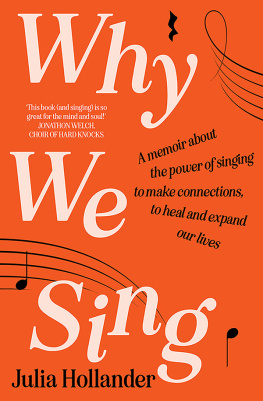
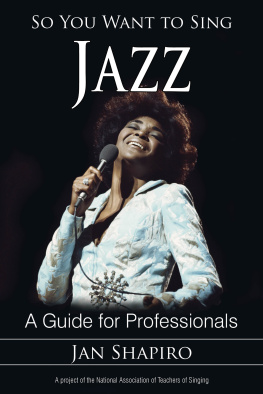
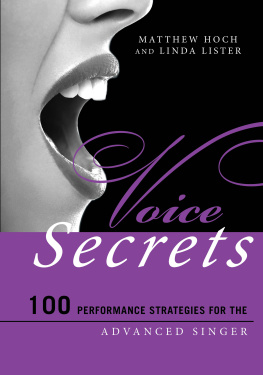
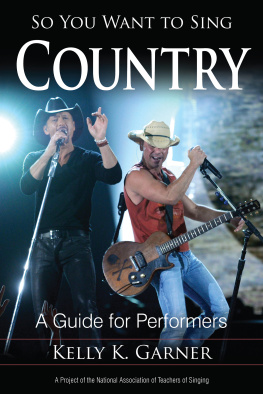
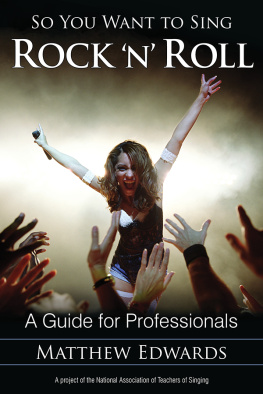
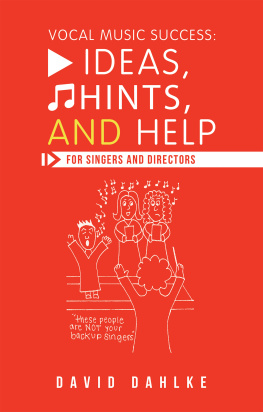
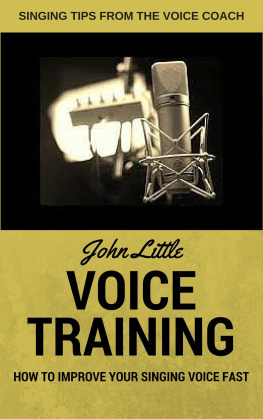
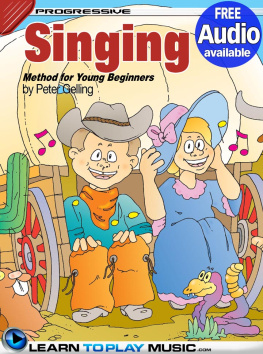

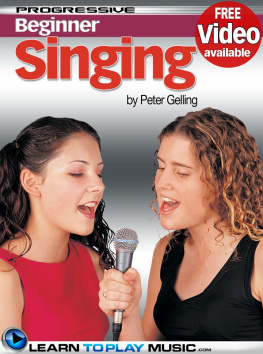

 TM The paper used in this publication meets the minimum requirements of American National Standard for Information Sciences Permanence of Paper for Printed Library Materials, ANSI/NISO Z39.48-1992.
TM The paper used in this publication meets the minimum requirements of American National Standard for Information Sciences Permanence of Paper for Printed Library Materials, ANSI/NISO Z39.48-1992.